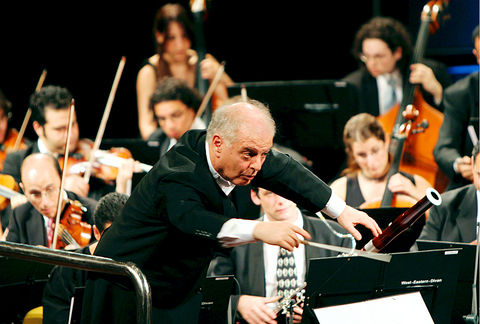The sound of Beethoven's Fifth Symphony drowned out the staccato of bullets on Sunday in the conflict-ridden Middle East as world-famous conductor Daniel Barenboim dazzled his Ramallah audience with both music and words.
Playing under the theme "Freedom for Palestine," Barenboim and his new West-Eastern Diwan orchestra were able to break all barriers and help an audience fatigued by strife to enjoy two hours of pure music from Beethoven and Mozart.
The interest in the concert was obvious for an hour before it started and for 15 minutes after the final note.

PHOTO: EPA
The 1,200-seat auditorium of the Ramallah Cultural Center was packed with a Palestinian, international and even Israeli audience an hour before the baton was scheduled to drop. As the seats filled, hundreds others milled in the hallways and the aisles hoping to get a seat or just to be allowed to stay in standing room and listen to Barenboim and the orchestra.
The same audience stood for 15 minutes, enthusiastically clapping and yelling "bravo" after Barenboim concluded the performance, giving Palestinians in Ramallah a chance to forget the checkpoints, the occupation, the wall and everything that has made their lives void of spirit, as one member of the audience remarked after the concert.
Outside the auditorium, the reality for West Bank residents had not yet changed after the concert, as Barenboim hoping to achieve with his music and orchestra.
A few audience members had to leave early to get home before some checkpoints at entrances to Ramallah closed. Others who waited until the end and headed home after the concert had to stop in long lines of cars waiting at checkpoints to be able to reach their homes. Barenboim realized this reality, and this is why he brought his new orchestra to Ramallah.
"What I want to say to you," Barenboim told the audience after the orchestra finished playing, "I have already said in the music.
"This is an orchestra for peace. This orchestra is not going to bring peace. What it can bring is understanding, patience and courage to listen to the narrative of the other, to hear the version of the other," he said.
"We came with a message of humanity; a message of solidarity for freedom that Palestine needs and the whole region needs. There is no military solution to this conflict. The destiny of these two people [Palestinians and Israelis] is inextricably linked," he said.
"It is the duty of everyone to find a way to live together. We either kill each other or learn to live together. It is this message we come with today," he said.
Barenboim said it took his orchestra members courage to come together and play in Israeli-occupied Ramallah. It was the dream of his close friend, the late Palestinian academic and author, Edward Said, to put the West-Eastern Diwan orchestra together and play for peace between Arabs and Jews.
Said's premature death left the task to Barenboim, who was able to bring musicians from different Arab countries, including Syria and Lebanon, which are at war with Israel, and Israeli musicians to play in occupied Ramallah.
While most of the orchestra members were European, the presence of a few Arab and Israeli musicians playing side by side in Ramallah made Barenboim and Said's dream come true.
The concert in Ramallah was the orchestra's first, and it plans to play in other Arab capitals in the future.

MONEY GRAB: People were rushing to collect bills scattered on the ground after the plane transporting money crashed, which an official said hindered rescue efforts A cargo plane carrying money on Friday crashed near Bolivia’s capital, damaging about a dozen vehicles on highway, scattering bills on the ground and leaving at least 15 people dead and others injured, an official said. Bolivian Minister of Defense Marcelo Salinas said the Hercules C-130 plane was transporting newly printed Bolivian currency when it “landed and veered off the runway” at an airport in El Alto, a city adjacent to La Paz, before ending up in a nearby field. Firefighters managed to put out the flames that engulfed the aircraft. Fire chief Pavel Tovar said at least 15 people died, but

LIKE FATHER, LIKE DAUGHTER: By showing Ju-ae’s ability to handle a weapon, the photos ‘suggest she is indeed receiving training as a successor,’ an academic said North Korea on Saturday released a rare image of leader Kim Jong-un’s teenage daughter firing a rifle at a shooting range, adding to speculation that she is being groomed as his successor. Kim’s daughter, Ju-ae, has long been seen as the next in line to rule the secretive, nuclear-armed state, and took part in a string of recent high-profile outings, including last week’s military parade marking the closing stages of North Korea’s key party congress. Pyongyang’s official Korean Central News Agency (KCNA) released a photo of Ju-ae shooting a rifle at an outdoor shooting range, peering through a rifle scope

South Korea would soon no longer be one of the few countries where Google Maps does not work properly, after its security-conscious government reversed a two-decade stance to approve the export of high-precision map data to overseas servers. The approval was made “on the condition that strict security requirements are met,” the South Korean Ministry of Land, Infrastructure and Transport said. Those conditions include blurring military and other sensitive security-related facilities, as well as restricting longitude and latitude coordinates for South Korean territory on products such as Google Maps and Google Earth, it said. The decision is expected to hurt Naver and Kakao

Gaza is rapidly running out of its limited fuel supply and stocks of food staples might become tight, officials said, after Israel blocked the entry of fuel and goods into the war-shattered territory, citing fighting with Iran. The Israeli military closed all Gaza border crossings on Saturday after announcing airstrikes on Iran carried out jointly with the US. Israeli authorities late on Monday night said that they would reopen the Kerem Shalom crossing from Israel to Gaza yesterday, for “gradual entry of humanitarian aid” into the strip, without saying how much. Israeli authorities previously said the crossings could not be operated safely during